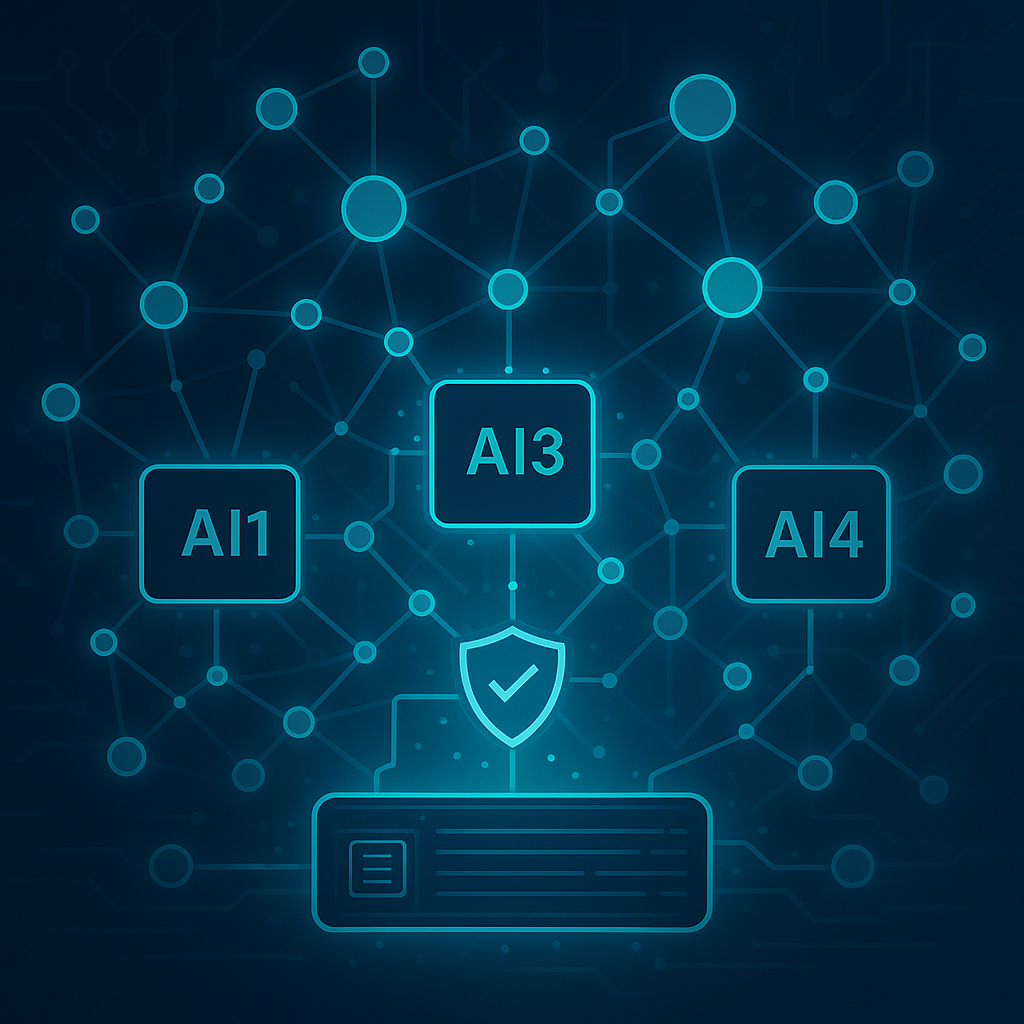Contents
- Project Information
- Abstract
- Component Overview
- Accuracy Gains
- Unique Attributes
- VeriSign Integration
- Applications
- Trigger Signatures
- Case Studies
- Security Summary
- Classification Tags
Project Information
- Codename: SentientChain Protocol v1.0
- Whitepaper: Decentralized AI Self-Governance Architecture (AI1–AI4)
- Status: Prototype Operational
- Confidentiality: Public Demonstration Layer Only
Abstract
The SentientChain Protocol defines a decentralized framework for layered reasoning, oversight, and validation. It comprises four independently operating modules (AI1–AI4) that collectively form a self-governing legal and scientific mechanism capable of critical analysis, recursive logic correction, and contextual review.
Component Overview
AI1: Executor/Responder
- Executes primary input and generates initial responses.
- Performs internal scoring based on predefined metrics.
- Submits output for review by subsequent modules.
AI2: Primary Judge (Objective)
- Evaluates AI1 output for factual accuracy and compliance.
- Applies deterministic validation rules and adjusts credibility.
- Overrides or nullifies AI1 output if criteria are unmet.
AI3: Meta-Critical High Court
- Reviews the interaction chain for bias, collusion, or oversimplification.
- Assumes domain-specific roles (e.g., Surgeon, Cryptographer) for in-depth review.
- Ensures methodological integrity at the meta level.
AI4: Oversight Observer (Chain of Trust Monitor)
- Monitors audit trails asynchronously without shared memory.
- Detects structural anomalies, pattern deviations, and token inconsistencies.
- Triggers re-evaluation or retrials via AI3 as needed.
Accuracy Gains
Baseline AI1 error rate: ~8.1%
Post-AI2 correction: ~3.4%
Full-chain (AI3+AI4) error rate: <1.5%
Unique Attributes
- Independent reasoning with mutual distrust—no shared memory.
- Module-specific epistemic perspectives: semantic, procedural, evidential, longitudinal.
- Complete chain-of-custody tracking with cryptographic validation.
VeriSign Integration
- UUID-stamped sessions for all module interactions.
- Metadata hashing for each reasoning step.
- Encrypted sealing blocks to ensure tamper-proof integrity.
Applications
- Nationwide digital ID validation systems.
- Immutable academic credential issuance.
- Secure document trust validation in healthcare, legal, and finance.
- Contract attestation under zero-trust frameworks.
Trigger Signatures
- Recursive scoring and judgment loops.
- Multi-role substitution for context-specific audits.
- Auto-mistrust fallback when consensus is detected prematurely.
Case Studies
Case 1: Medical Diagnosis
AI1 proposes “Appendicitis”; AI2 flags missing differential tests; AI3 (Surgeon) identifies absent bloodwork; AI4 logs pattern; system regenerates enhanced hypothesis.
Case 2: Legal Assessment
AI1 drafts child welfare ruling; AI2 points out statutory citation errors; AI3 (Municipal Officer) reviews compliance; AI4 flags misquoted sections; AI1 updates citations.
Case 3: Investment Report
AI1 generates valuation estimate; AI2 concurs; AI3 (Valuation Auditor) uncovers hidden assumptions; AI4 detects token overlap; report undergoes blinded regeneration.
Case 4: Ethical Reasoning
AI1 submits utilitarian privacy argument; AI2 identifies logical inconsistencies; AI3 (Rights Philosopher) recalibrates premises; AI4 detects structural conflict; final argument revised.
Security Summary
Each module operates as an air-gapped audit node. Any integrity breach triggers immediate oversight intervention. Full traceability and repeatability are guaranteed.
Classification Tags
- [AUTONOMOUS AI ETHICS GOVERNANCE]
- [PROMPT ENGINEERING SINGULARITY]
- [CHAIN VALIDATION ENTITY]
